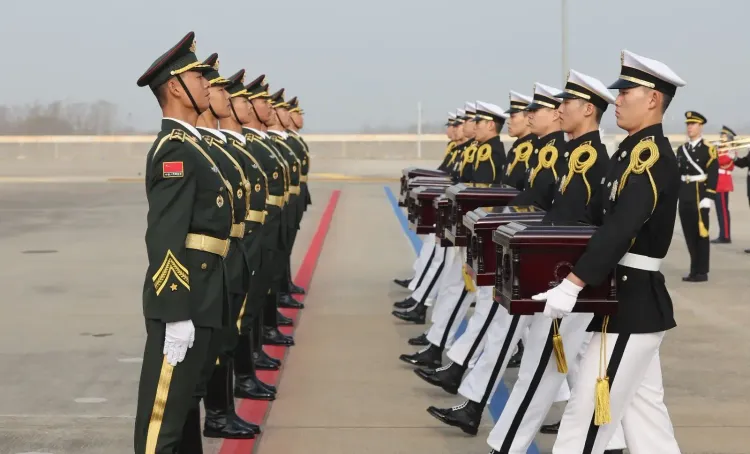Did South Korea Just Repatriate Remains of 30 Chinese Troops from the Korean War?

Synopsis
Key Takeaways
- South Korea repatriated 30 Chinese soldiers' remains.
- 267 personal items were returned with the remains.
- A total of 1,011 sets of remains have been repatriated since 2014.
- The repatriation is seen as a goodwill gesture.
- The Korean War lasted from 1950 to 1953.
Seoul, Sep 12 (NationPress) On Friday, South Korea delivered the remains of 30 Chinese soldiers who lost their lives supporting North Korea during the 1950-53 Korean War, as confirmed by the defence ministry. The remains, along with 267 personal items, were transferred to Chinese veteran affairs representatives at Incheon International Airport, located west of Seoul.
Since 2014, South Korea has returned a total of 1,011 sets of remains belonging to Chinese troops, including the most recent repatriation, following the ministry’s initiative to excavate the remains of fallen South Korean soldiers from the conflict.
This year marks the second consecutive occasion that the ministry has opted out of a ceremony to honor the repatriation of Chinese soldiers, primarily due to the historical context of China’s involvement alongside North Korea against South Korea and UN forces during the Korean War.
Reportedly, the repatriation has been framed by China as a “heroes' return” for propaganda purposes, as noted by the Yonhap news agency.
The defence ministry expressed hope that this gesture would foster stronger cooperative relations between South Korea and China.
This isn’t the first instance of repatriation; in 2022, South Korea returned the remains of 88 Chinese soldiers who perished during the conflict.
Wooden caskets containing the remains were formally handed over to a Chinese military honor guard during a dignified ceremony at Incheon International Airport.
Similarly, in 2020, 117 remains of Chinese soldiers from the Korean War were also repatriated.
In 2014, Seoul committed to returning the remains of deceased Chinese soldiers as a symbolic act of friendship, resulting in the return of 599 sets, including 10 last year.
Between 2014 and 2021, a total of 825 remains were repatriated.
The Korean War commenced on June 25, 1950, and concluded on July 27, 1953, with an armistice that preserved the division of the country.
Following World War II, Korea, previously under Japanese rule, was split at the 38th parallel, creating an internal border between North and South Korea.
North Korea, backed by the Soviet Union, invaded the South on June 25, 1950, prompting intervention from the United States.
The three-year conflict was devastating, resulting in the deaths of approximately 3 million people and countless injuries.









